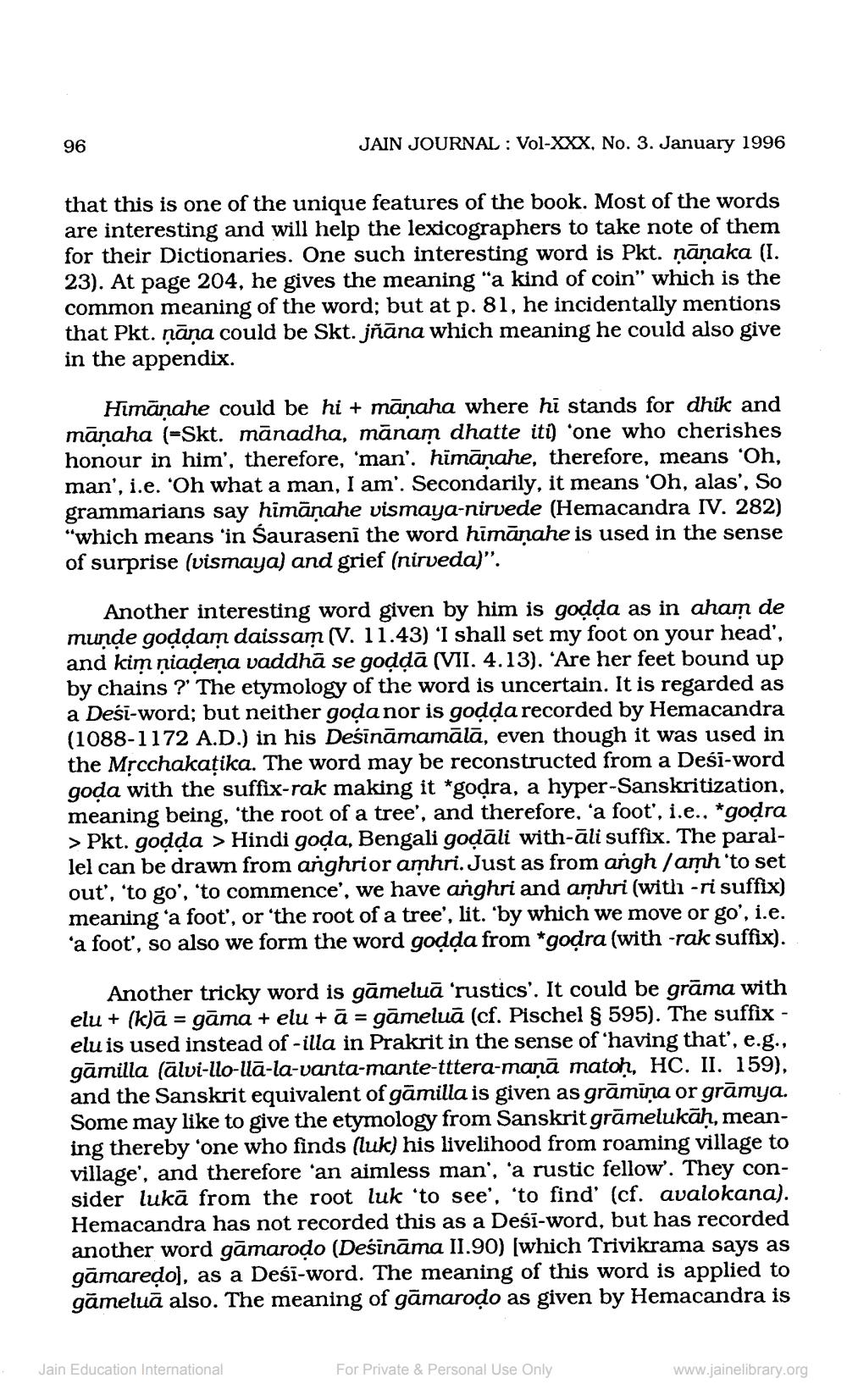Book Title: Jain Journal 1996 01 Author(s): Jain Bhawan Publication Publisher: Jain Bhawan Publication View full book textPage 7
________________ 96 that this is one of the unique features of the book. Most of the words are interesting and will help the lexicographers to take note of them for their Dictionaries. One such interesting word is Pkt. ṇāņaka (I. 23). At page 204, he gives the meaning "a kind of coin" which is the common meaning of the word; but at p. 81, he incidentally mentions that Pkt. ṇāna could be Skt. jñāna which meaning he could also give in the appendix. JAIN JOURNAL: Vol-XXX, No. 3. January 1996 Himanahe could be hi + māṇaha where hi stands for dhik and māṇaha (-Skt. mānadha, mānam dhatte iti) 'one who cherishes honour in him', therefore, 'man'. himāṇahe, therefore, means 'Oh, man', i.e. 'Oh what a man, I am'. Secondarily, it means 'Oh, alas', So grammarians say himanahe vismaya-nirvede (Hemacandra IV. 282) "which means 'in Sauraseni the word himānahe is used in the sense of surprise (vismaya) and grief (nirveda)". Another interesting word given by him is godda as in aham de munde goddam daissam (V. 11.43) 'I shall set my foot on your head', and kim niaḍeņa vaddhā se goḍḍā (VII. 4.13). 'Are her feet bound up by chains?' The etymology of the word is uncertain. It is regarded as a Desi-word; but neither goda nor is godda recorded by Hemacandra (1088-1172 A.D.) in his Deśīnāmamālā, even though it was used in the Mṛcchakatika. The word may be reconstructed from a Desi-word goda with the suffix-rak making it *goḍra, a hyper-Sanskritization, meaning being, 'the root of a tree', and therefore, 'a foot', i.e.. *goḍra > Pkt. goḍda > Hindi goda, Bengali goḍāli with-āli suffix. The parallel can be drawn from anghrior amhri. Just as from angh/amh 'to set out', 'to go', 'to commence', we have anghri and amhri (with -ri suffix) meaning 'a foot', or 'the root of a tree', lit. 'by which we move or go', i.e. 'a foot', so also we form the word godda from *goḍra (with -rak suffix). Another tricky word is gāmelua 'rustics'. It could be grāma with elu + (k)ā gāma + elu + ā = gāmelua (cf. Pischel § 595). The suffix - elu is used instead of -illa in Prakrit in the sense of 'having that', e.g., gāmilla (alvi-llo-lla-la-vanta-mante-tttera-manā matoḥ, HC. II. 159), and the Sanskrit equivalent of gamilla is given as grāmiņa or grāmya. Some may like to give the etymology from Sanskrit grāmelukāḥ, meaning thereby 'one who finds (luk) his livelihood from roaming village to village', and therefore 'an aimless man', 'a rustic fellow'. They consider luka from the root luk 'to see', 'to find' (cf. avalokana). Hemacandra has not recorded this as a Desi-word, but has recorded another word gamaroḍo (Desināma II.90) [which Trivikrama says as gāmareḍo], as a Desi-word. The meaning of this word is applied to gāmelua also. The meaning of gamarodo as given by Hemacandra is = Jain Education International For Private & Personal Use Only www.jainelibrary.orgPage Navigation
1 ... 5 6 7 8 9 10 11 12 13 14 15 16 17 18 19 20 21 22 23 24 25 26 27 28 29 30 31
